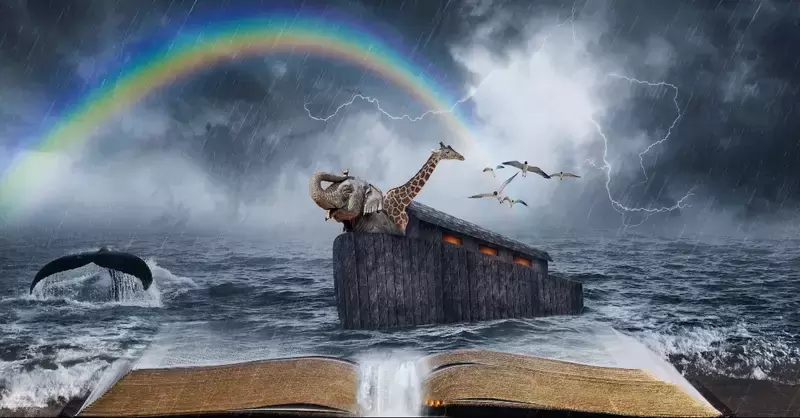point us toward
Jesus and Grace?
Noah was an obedient servant of God amidst a sinful world.
He is most well-known for building an ark that preserved himself and his family, as well as representatives of every land animal, from a great flood that God unleashed in judgment upon the earth.
The name Noah means “rest.” It derives from the Hebrew נוח (nuah), to rest. The name could also mean "comfort." It may seem ironic because the story of Noah involves neither of these things. After all, God floods the earth, and that doesn't seem like a whole lot of rest or comfort for its inhabitants. But perhaps this name can remind us of the feeling that Noah's family likely felt when at last the Flood waters receded and that God comforted them with a rainbow, reminding them that he would never flood the entire earth again. What does the rainbow represent? It represents God's promise to save and deliver us- the arc delivering noah to safety is a -foreshadow- of our deliverance in Jesus Christ, God's ultimate promise for mankind.
When God saw how wicked and corrupt man had become, He regretted creating them and decided to destroy all of mankind (Genesis 6:7). However, God gave Noah favor because he saw that he was righteous (Genesis 6:8). God commanded Noah to build an ark to house and preserve his family, as well as every male and female species of land animal, from His punishment of a flood on the earth (Genesis 6:14-21).
The rain fell and the floodwaters rose around the ark for 40 days, however, Noah and the other inhabitants "remained safe" (Genesis 7:17-18).
Noah’s family consisted of eight people: Noah, his wife, three sons, and their wives. As they were the only human survivors of the flood, they became the founders of a new and second lineage of mankind that brought about our salvation in Jesus Christ.
The events leading up to the flood can be seen as a forerunner for the second coming of Jesus
(Matthew 24:37-39).
Some lessons we can learn is that God can provide a way out to salvation. People on earth had a chance to repent and go with Noah onto the ark, but they refused. We also see lessons of God's faithfulness in this passage. He does not leave Noah's family out in the floodwaters. Instead, the waters eventually recede and they find land again.
Archaeologists tell us that every great civilization in history had a story of a cataclysmic flood.
But depend on Christ, who confirmed the story by saying,
“As the days of Noah were, so also will the coming of the Son of Man be” (Matthew 24:37).
What characterized the days of Noah?
Apostasy.
Anarchy.
Ungodly philosophy.
“Then the LORD saw that the wickedness of man was great in the earth, and that every intent of the thoughts of his heart was only evil continually” (Genesis 6:5).
The days of Noah have returned to us.
The wickedness reached such a level that “the LORD was sorry that He had made man on the earth, and He was grieved in His heart. So the LORD said, ‘I will destroy man whom I have created from the face of the earth, both man and beast, creeping thing and birds of the air, for I am sorry that I have made them.’
But Noah found grace in the eyes of the LORD” (Genesis 6:6-8;)
In these dangerous days, we have the
grace of God.
GRACE PROVIDES A SAVIOR
Noah needed to be saved, so God told him, “Make yourself an ark” (Genesis 6:14a).
That ark pictures Jesus Christ. (Read 1 Peter 3:18-20.)
“Make yourself an ark of gopherwood; make rooms in the ark, and cover it inside and outside with pitch” (Genesis 6:14). Gopherwood is cypress, which will not rot, and “pitch” is tar. Interestingly, this is not the usual word for pitch—this word is translated in the rest of the Bible as atonement. The water was God’s judgment, and not one drop could come through.
Christ is the atonement for our sin, and in Him, no judgment can get to you.
The Ark’s Sufficiency“And this is how you shall make it: The length of the ark shall be three hundred cubits, its width fifty cubits, and its height thirty cubits” (Genesis 6:15). The ark was 3 million cubic feet.
There was room on that ark, and there is room at the cross.
Notice that God does not say the ark has a prow or stern. Archaeologists tell us these are the dimensions of a coffin. The ancients built their coffins out of cypress because it would not decay. Why is the ark a giant coffin? Because when Noah came into that ark, it pictured the way we are buried with Christ in baptism. (See Romans 6:4.)
“You shall make a window for the ark, and you shall finish it to a cubit from above; and set the door of the ark in its side” (Genesis 6:16a). This is the door that God sealed, and nobody could open it. (See Genesis 7:16.)
But Noah could open the window and look up. God was saying, “From now on, you are to be Heavenly minded.”
We are sealed into Christ by the Holy Spirit.
We look into Heaven through Jesus Christ.
And you shall take for yourself of all food that is eaten, and you shall gather it to yourself; and it shall be food for you and for them” (Genesis 6:21). God took care of all of their needs. When you come to Jesus, you have shelter and substance. Jesus not only saves but also satisfies. The word of God is our bread and spiritual food.
Then the ark rested in the seventh month, the seventeenth day of the month, on the mountains of Ararat” (Genesis 8:4). You might blow past this. But when the ark arrived, having been steered by God (because it also had no helm!), it was the seventh month in the Jewish calendar—April.
This is the time of Passover, when Jesus came out of the grave, having taken the floodwaters of God’s wrath upon the cross!
GRACE PROVIDES SALVATION
Why do we have a Savior?
So we can be saved!
How? “For by grace you have been saved through faith, and that not of yourselves; it is the gift of God, not of works, lest anyone should boast.
For we are His workmanship, created in Christ Jesus for good works, which God prepared beforehand that we should walk in them” (Ephesians 2:8-10; emphasis added).
If you keep three prepositions in mind, you will never get confused about the relationship of faith and good works. You are saved…
- by grace,
- through faith,
- for good works.
The ark shows that salvation is by grace.
"But Noah found grace in the eyes of the LORD…. ‘I will establish My covenant with you; and you shall go into the ark—you, your sons, your wife, and your sons’ wives with you’” (Genesis 6:8,18). God only has one plan of salvation, and that is by grace.
Grace means that God saves us apart from any effort of our own.
“Then the LORD said to Noah, ‘Come into the ark, you and all your household’” (Genesis 7:1a).
Noah had to take that step through faith. (See Hebrews 11:7.)
Noah was saved for good works. “So God blessed Noah and his sons, and said to them: ‘Be fruitful and multiply, and fill the earth’” (Genesis 9:1).
We do not do good works in order to be saved; we do them because we have been saved.
GRACE PROVIDES SECURITY
God did not say, “Noah, go into the ark.” He said, “Come”—meaning God was in the ark.
In Christ, you are as safe as you can possibly be. About those who believe in Christ, the Bible says, “you were sealed with the Holy Spirit of promise” (Ephesians 1:13b). Not only did God shut the water out; God shut Noah in. Could Noah have lost his salvation? God shut the door! Noah may have fallen down inside that ark, but he couldn’t fall out of it.
Jesus said, “I give them eternal life, and they shall never perish; neither shall anyone snatch them out of My hand” (John 10:28). If you are saved by works, you will have to be kept by works.
But we are saved by grace, and kept by grace.
The first time, God destroyed the world by water.
The second time, it will be by fire.
“…The world that then existed perished, being flooded with water. But the heavens and the earth which are now preserved by the same word, are reserved for fire until the day of judgment and perdition of ungodly men…The Lord is not slack concerning His promise, as some count slackness, but is longsuffering toward us, not willing that any should perish but that all should come to repentance” (2 Peter 3:6b-7,9).
Now here is the question: “Therefore, since all these things will be dissolved, what manner of persons ought you to be in holy conduct and godliness, looking for and hastening the coming of the day of God, because of which the heavens will be dissolved, being on fire, and the elements will melt with fervent heat” (2 Peter 3:11-12)?
Isaac answered and said to Esau, "Behold, I have made him lord over you, and all his brothers I have given to him for servants, and with grain and wine I have sustained him. What then can I do for you, my son?" Esau said to his father, "Have you but one blessing, my father? Bless me, even me also, O my father." And Esau lifted up his voice and wept. Then Isaac his father answered and said to him: "Behold, away from the fatness of the earth shall your dwelling be, and away from the dew of heaven on high. By your sword you shall live, and you shall serve your brother; but when you grow restless you shall break his yoke from your neck." ~ Genesis 27:37-40
Read related articles about the life of Jacob and Esau:
Rebekah sends Jacob to Mesopotamia to avoid Esau's intention to kill him. In his travel, the Lord visits Jacob in a dream known as Jacob's Ladder.
In Mesopotamia, Jacob meets Haran and his daughter Rachel. Read the Bible Story of Jacob and Rachel.


 RSS Feed
RSS Feed
























































